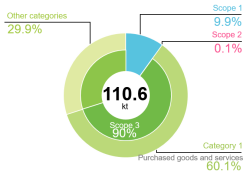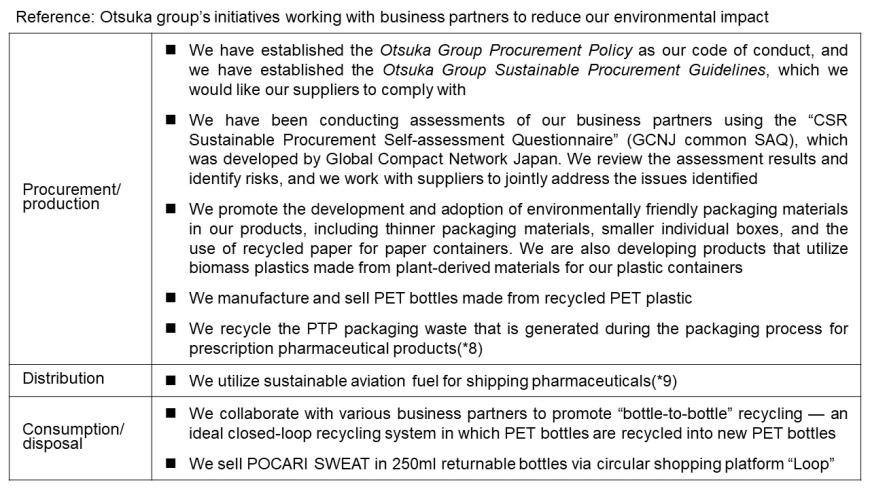Supply of Renewable Energy to Business Partners -Towards Achieving Carbon Neutrality Throughout Our Supply Chain-
October 29, 2024
Otsuka Holdings Co., Ltd. (Head office: Chiyoda-ku, Tokyo, Japan; President and Representative Director, CEO: Tatsuo Higuchi) has begun supplying renewable energy to business partners with the aim of achieving carbon neutrality throughout its supply chain. This is the first time renewable energy procured by Otsuka Holdings has been provided to companies outside the Otsuka group.
The Otsuka group has established the 2050 environmental vision called Net Zero that aims to reduce the group’s entire environmental impact of its business activities to zero, and it is pursuing initiatives to lower its environmental impact not only in its own production activities but also throughout its entire supply chain. With this vision in mind, we have developed an integrated energy service system and have begun supplying group business locations with renewable energy that includes batch procurement as well as energy generated within the group, with the intention of maximizing energy usage efficiency in order to promote both business growth and environmental conservation. We have begun supplying renewable energy to business partners to whom we outsource the production of some of the containers for our group’s products as a means of further reducing the environmental impact of our entire supply chain.

Companies are now required to reduce not only their own direct emissions (Scope 1 and 2) but also CO2 emissions produced by the activities of suppliers, customers, and other parties (Scope 3) throughout the entire supply chain, from product procurement to production, sales, distribution, consumption, and disposal. Scope 3 emissions account for the majority of the overall emissions of the Otsuka group,(*1) and we have been working with our business partners to reduce our environmental impact.
We have evaluated(*2) the carbon footprint(*3) of our products to quantify the reduction in environmental impact that supplying renewable energy to our business partners will have.
Comparison of carbon footprint values using non-renewable energy and renewable energy
■ Oronine H Ointment 100g Bottle (excludes product contents)

Oronine H Ointment is a products for treating minor skin conditions and injuries. The carbon footprint value of this product from the procurement stage to the production stage has been reduced by 43.6% in comparison to conventional products.(*4) The carbon footprint of the procurement stage has been reduced by 41.1%. That includes the carbon footprint values for the containers (bottles) manufactured by a business partner that has adopted renewable energy as well as the packaging materials(labels, lids, boxes, etc.) manufactured by other suppliers. The carbon footprint of the production stage has been reduced by 74.2% due to the adoption of renewable energy by Otsuka Pharmaceutical Factory, Inc.(*5)
■ ELNEOPA-NF No. 2 Injection 1000mL Soft Bag (excludes product contents)

ELNEOPA-NF No. 2 Injection is an injection for total parenteral nutrition. The carbon footprint value of this product from the procurement stage to the production stage has been reduced by 27.4%.(*6) The carbon footprint of the procurement stage has been reduced by 6.0%. That includes the carbon footprint values for some of the containers (MP port: circled red) manufactured by a business partner that has adopted renewable energy as well as the packaging materials(container films, etc.) manufactured by other suppliers. The carbon footprint of the production stage has been reduced by 92.4% due to the adoption of renewable energy by Otsuka Pharmaceutical Factory, Inc.(*5)
■ Lactec Injection 500mL Soft Bag (excludes product contents)

Lactec Injection 500mL Soft Bag is a lactated Ringer’s solution. The carbon footprint value of this product from the procurement stage to the production stage has been reduced by 12.1%.(*7) The carbon footprint of the procurement stage has been reduced by 6.7%. That includes the carbon footprint values for some of the containers (NC port: circled red) manufactured by a business partner that has adopted renewable energy as well as the packaging materials(container films, etc.) manufactured byother suppliers. The carbon footprint of the production stage has been reduced by 92.5% due to the adoption of renewable energy by Otsuka Pharmaceutical Factory, Inc.(*5)
The Otsuka group has established a 2050 environmental vision called Net Zero that aims to reduce the group’s entire environmental impact of its business activities to zero. In addition, we have identified “reducing our environmental impact” as one of our material issues, and are working towards carbon neutrality by 2050 with regard to Scope 3. We will continue to work with our business partners to reduce our environmental impact through the use of new technologies and solutions with the aim of helping to achieve carbon-free society and, ultimately, a sustainable society.

*1 Otsuka Pharmaceutical, Otsuka Pharmaceutical Factory, Taiho Pharmaceutical, Otsuka Chemical, and Otsuka Foods
*2 Calculation supported by Wastebox, Inc.
*3 Carbon footprint: This is a method of converting the greenhouse gas emissions produced in all aspects of our products and services, from raw materials procurement to disposal and recycling, to equivalent CO2 emissions that can be represented as a numerical value and can be displayed on products.
*4 From procurement to production (cradle-to-gate): 43.6% reduction; from procurement to disposal (cradle-to-grave): 29.1% reduction
*5 Adopted in 2019
*6 From procurement to production (cradle-to-gate): 27.4% reduction; from procurement to disposal (cradle-to-grave): 24.0% reduction
*7 From procurement to production (cradle-to-gate): 12.1% reduction; from procurement to disposal (cradle-to-grave): 9.9% reduction
*8 Otsuka Pharmaceutical and Taiho Pharmaceutical Commence Material Recycling of Waste PTP Used in Pharmaceutical Packaging
*9 Otsuka Pharmaceutical Joins Project to Promote Use of Sustainable Aviation Fuel in Air Cargo Transportation - Operated by Tokyo Metropolitan Government, Aiming for a Decarbonized Society -








